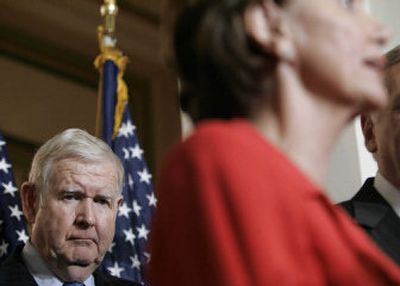Democrats choose Hoyer for new majority leader

WASHINGTON – House Democrats elected Rep. Steny Hoyer of Maryland the new majority leader Thursday over strong opposition from House Speaker-elect Nancy Pelosi of California, exposing a deep political divide even before the party takes control.
The 149-86 vote for Hoyer over Rep. John Murtha of Pennsylvania was viewed by many in the party as a repudiation of Pelosi’s strong-arm tactics and a recognition of Hoyer’s tireless work to elect a new Democratic majority for the first time in 12 years. If the Hoyer camp’s headcount was correct going into Thursday’s secret balloting, Pelosi and her allies were unable to sway a single vote for Murtha, a close associate.
Pelosi was formally chosen by the Democratic caucus as the first female House speaker in history. In a show of unity after the closed-door meeting in a House office building, she and Hoyer smiled and embraced. But the two longtime rivals must now try to pick up the pieces after a bitter intraparty fight and prepare for a new Congress in January when the Democrats must be ready to pass a new domestic agenda and challenge President Bush on the Iraq war and foreign policy.
A buoyant Hoyer vowed to work closely with Pelosi and Murtha to force Bush to change his Iraq policy and begin withdrawing troops. Pelosi had strongly backed Murtha for majority leader largely because of his early call for a troop withdrawal, which she said helped galvanize the party and win the Nov. 7 midterm elections.
Both Hoyer and Murtha claimed to have a majority of votes going into Thursday’s showdown, but even Pelosi had to concede that Hoyer’s final margin was “a stunning victory.”
Pelosi had made it clear for months that she favored Murtha over Hoyer. But, on Sunday, she shocked even her staff by directly intervening in the contest in issuing a letter throwing her support to Murtha, a former Marine and the ranking Democrat on the House Appropriations subcommittee on defense.
Pelosi’s aggressive, last-minute campaign for Murtha in the face of overwhelming Hoyer support left many Democrats worried that she has become too reliant on a tight inner circle, too reluctant to listen to the broader Democratic caucus and mistakenly convinced that she can dictate the direction the caucus must take.
“Basically, she got spanked,” said a House Democrat close to both Pelosi and Hoyer, who spoke on the condition of anonymity for fear of repercussions. “She got taken to the woodshed. If she doesn’t get it, this is going to be a big problem over the long run.”
“Maybe it will help Nancy understand the use of power, the time and place for it,” said a senior Democrat with close ties to Capitol Hill.
After the party elections Thursday, Pelosi and Hoyer emerged from the caucus room beaming and grabbed each others’ hands. Behind them stood a grim-looking Murtha, hands pushed into his pockets and his eyes cast down.
“We’ve had our debates. We’ve had our disagreements in that room, and now that is over, as I said to my colleagues … ‘let there be peace on Earth, and let it begin with us.’ Let the healing begin,” Pelosi said.
Later, Hoyer held private conversations with Murtha and Rep. George Miller, D-Calif., a Pelosi confidante who led the charge for Murtha’s election. All of the players pledged to unify behind a new Democratic team that will include House Majority Whip James Clyburn, D-S.C., House Democratic Caucus Chairman Rahm Emanuel, D-Ill., and House Democratic Caucus Vice Chairman John Larson, D-Conn.
“We may have … differences from time to time,” Hoyer said. “But the Republicans need to know, the president needs to know, and the country needs to know our caucus is unified today.”